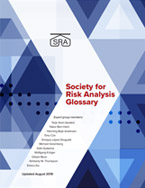 Terje Aven, Yakov Ben-Haim, Henning Boje Andersen, Tony Cox, Enrique López Droguett, Michael Greenberg, Seth Guikema, Wolfgang Kröger, Ortwin Renn, Kimberly M. Thompson, Enrico Zio
Terje Aven, Yakov Ben-Haim, Henning Boje Andersen, Tony Cox, Enrique López Droguett, Michael Greenberg, Seth Guikema, Wolfgang Kröger, Ortwin Renn, Kimberly M. Thompson, Enrico Zio
Society for Risk Analysis
Sinopse: Several attempts have been made to establish broadly accepted definitions of key terms related to concepts fundamental for the risk analysis field. Many scholars and institutions have devoted considerable time and effort to providing definitions and bringing some sort of unity and standardization to the field. The work has been based on the conviction that a scientific field or discipline must stand solidly on well-defined and universally understood terms and concepts.
Yet, experience has shown that to agree on one unified set of definitions is not realistic – the several attempts made earlier have not achieved success. The present work is founded on the idea that it is still possible to establish an authoritative glossary, the key being to allow for different perspectives on fundamental concepts and make a distinction between overall qualitative definitions and their associated measurements. For example, defining a probability cannot be meaningfully done without referring to different types of probability (subjective, frequentist, classical, etc.), but an overall qualitative definition such as “a measure for representing or expressing uncertainty, variation or beliefs, following the rules of probability calculus” could nonetheless be broadly accepted as useful.
Allowing for different perspectives does not mean that all definitions that can be found in the literature will be included in the glossary. The definitions included must meet some basic criteria – a rationale – such as being logical, well-defined, understandable, precise, etc. We will provide only definitions that are acknowledged by the committee – i.e., their meaning, rationale and justification will have to
pass the scrutiny of its members.
Also, it is not the aim to present an all-inclusive glossary – only key generic concepts within the field of risk analysis are covered. This means that many terms specific of various application areas are not included. The committee hopes that the logic of the glossary can be useful also as a starting point for the development of these more specific terms. Given the above, we claim that the present glossary is unique in its approach compared to existing risk analysis related glossaries (including the ISO 31000 on risk management terminology), with its incorporation of different perspectives and its systematic separation between overall qualitative concepts and their measurements.
